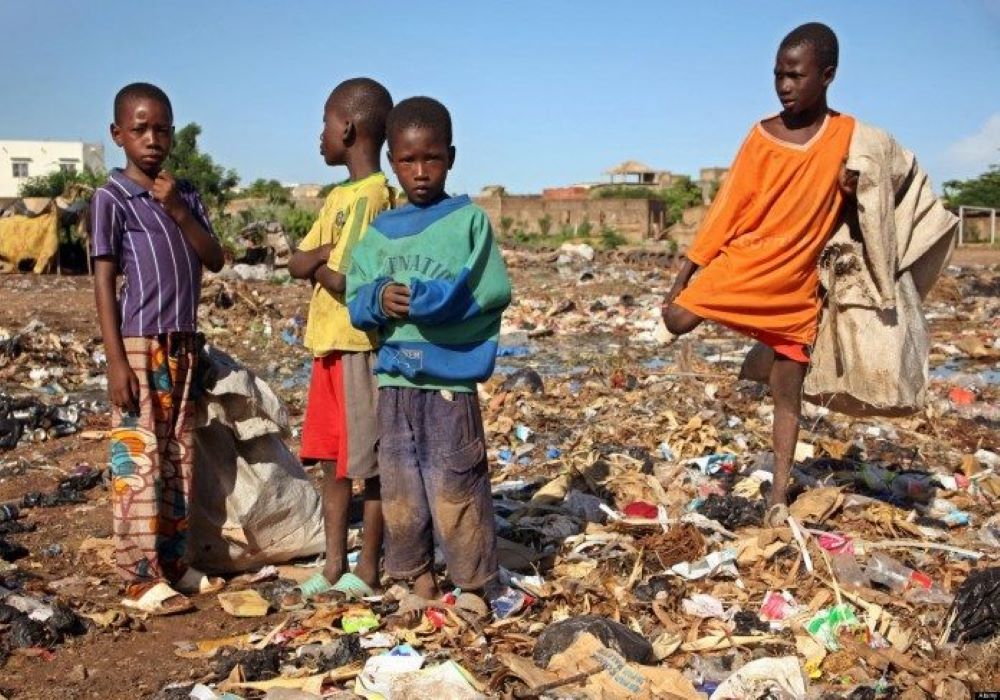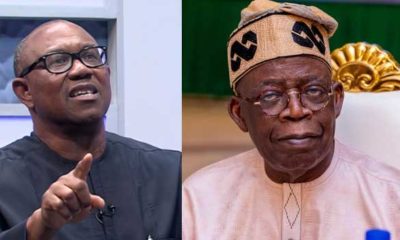NEWS
Poverty Tightening Noose on Nigeria, Africa – W’Bank

The estimated per capita income growth of 0.7 percent for Nigeria and the rest of Sub-Saharan Africa in 2022 is insufficient to meet the challenging goals of poverty reduction and shared prosperity in the medium to long term, but authorities are not meeting it.
This is contained in the World Bank Group’s report titled “Africa’s Pulse: An analysis of issues shaping Africa’s economic future”.
In the report, the Washington-based bank made it clear that poverty reduction trends, which the pandemic impacted negatively, had slowed further.
The report has it that the pandemic led to a lasting impact on long-term growth, with consequences on poorest of the poor, tending to stimulate extreme poverty.
The weak rebound of the Nigerian economy in the aftermath of the pandemic along with the setback from rising inflation, the report pointed out, was insufficient to reverse pandemic-induced job and income losses.
It stated, “Rising inflation is weighing on economic activity in Sub-Sahara. The upward trend in inflation following the post-pandemic period was exacerbated by the war in Ukraine, soaring to record highs in many countries.
“The escalation of the war has fueled a rise in commodity prices, particularly food and energy prices. High pass-through of food and fuel prices to consumer prices has caused headline inflation to spike.”
In addition, it noted that rising inflation was weighing on economic activities in Nigeria, and that the upward trend in inflation following the post-pandemic period was exacerbated by the war in Ukraine.
“The escalation of the war has fueled a rise in commodity prices, particularly food and energy prices. High pass-through of food and fuel prices to consumer prices has caused headline inflation to spike.
The fiscal space to mount effective responses today is gone because of high levels of debt across Sub-Saharan African countries, rising borrowing costs, and depleted public savings,” it added.
This follows an earlier report issued by the World Bank titled “A Better Future for All Nigerians: Nigeria Poverty Assessment 2022,” in which it noted that deep structural reforms guided by evidence were urgently needed if millions of Nigerians were to be lifted out of poverty.
It identified sluggish growth, low human capital, labour market weaknesses, and exposure to shocks as some of the factors chaining down Nigeria’s poverty reduction efforts.
The report has it that up to 40 percent of the Nigerian population were living below the national poverty line.
Recall that in its recent review of Nigeria’s poverty map, the National Bureau of Statistics (NBS) averred that 63 percent of the populace, an estimated 133 million people were multidimensionally poor.
This figure is at variance with an earlier projection by the World Bank, which placed 95 million Nigerians under the poverty line.
NEWS
Moghalu Prescribes Good Governance As Panacea To Ethnic Agitation

The President of the African School of Governance, Kingsley Chiedu Moghalu has admonished state actors against resorting to brutal force in the bid to muscle out separatist agitators.
In the aftermath of Mazi Simon Ekpa, the Finland based Biafran nationalist agitator being caught in legal web and the Nigerian government moving swiftly to seek his repatriation, the former deputy governor of the Central Bank of Nigeria (CBN) has cautioned that ‘We either fix our problems, or our problems will eventually “fix” us. No alternative to a renegotiated union.’
ALSO READ: Finnish Police Arrest Simon Ekpa Over Terror-Related Allegations
The political economist, while expressing his hope in Nigeria, made it clear that “hope is not a strategy”.
He bared his mind in a series of posts on his verified handle on micro-blogging site, X on Friday.
Moghalu wrote, “Despite sustained contemporary difficulties, I am hopeful about Nigeria. But hope is not a strategy. We need to improve state capacity for effective governance.
“We either fix our problems, or our problems will eventually “fix” us. No alternative to a renegotiated union.
“We must learn to be honest with ourselves and address the root causes of our problems. Why ignore them, when the problem is actually quite solvable? The problem with continuing with this approach is that when the danger crystallizes, those who thought they were benefiting from
NEWS
N1.7trn Loan: Atiku Blames NASS For Worsening Nigeria’s Debt Burden
Former Vice President, Atiku Abubakar has criticized the federal government’s plan to secure an additional N1.7 trillion loan through Eurobonds to cover a shortfall in the 2024 budget, describing the borrowing as unsustainable and harmful to Nigeria’s economy.
In a statement shared on Thursday via his X (formerly Twitter) handle, Atiku accused the Bola Tinubu-led administration of burdening Nigerians with debt while failing to provide clear answers about the country’s fiscal challenges.
READ ALSO: CSR: Dangote Cement Fuels Education With Support Projects At Lagos Schools
He also faulted the National Assembly for enabling what he called a “voracious appetite” for loans.
The former Peoples Democratic Party (PDP) presidential candidate expressed alarm over a recent World Bank report ranking Nigeria as the third most indebted country to the International Development Association (IDA), calling the development troubling.
“The recent report released by the World Bank, showing Nigeria as the third most indebted country to the International Development Association (IDA), is very concerning,” Atiku stated.
He raised further concerns about the government’s decision to benchmark the proposed loan at an exchange rate of 1 USD to N800, despite the Central Bank of Nigeria’s official rate being over N1,600.
“What makes this particular loan proposal even more concerning is that it is benchmarked at the exchange rate of 1 USD to N800, whereas the current exchange rate from the Central Bank of Nigeria stands at over N1,600 to 1 USD,” he said.
Atiku questioned the need for additional borrowing, given the government’s earlier claims of record-high revenue collection.
“In July this year, Tinubu boasted that the FIRS and Customs under his watch had collected all-time high revenues to finance the budget. Why are they still borrowing?” he said
He accused the government of a lack of transparency, describing the borrowing spree as detrimental to Nigerians already struggling under economic hardship.
“There is something that they are not telling Nigerians, even as they are being crushed by a combination of their failed trial-and-error policies and loan rackets.”
Atiku also referenced a report by BudgIT, a budget monitoring group, which criticized the 2024 budget for its inefficiencies.
He alleged that corruption, rather than infrastructure or development needs, was driving the government’s borrowing decisions.
“These loans are powered by corruption and not for infrastructure and development needs. This voracious appetite for humongous loans is deeply concerning,” he said.
Reflecting on Nigeria’s financial history, Atiku lamented the return to significant foreign indebtedness just years after former President Olusegun Obasanjo’s administration cleared the country’s debt.
“It is agonizing to see that just a few years after the Obasanjo administration took us out of foreign indebtedness, we are today back at the top spot in the same conundrum,” he stated.
He called for a more cautious approach to borrowing, urging the government to prioritize fiscal responsibility and transparency to avoid worsening Nigeria’s economic challenges.
International News
ICC Issues Arrest Warrants For Israeli Prime Minister Netanyahu, Others
The International Criminal Court (ICC) has taken a historic step, issuing arrest warrants for Israeli Prime Minister Benjamin Netanyahu and former Defense Minister Yoav Gallant.
The charges include crimes against humanity and war crimes allegedly committed during Israel’s recent assault on Gaza.
In a detailed statement, the ICC accused the Israeli leaders of “intentionally and knowingly depriving the civilian population in Gaza of objects indispensable to their survival, including food, water, and medicine and medical supplies, as well as fuel and electricity.”
READ MORE: Osun Govt Decries Attempted Murder Of Park Mgt Chairman By Police
The ICC’s move marks a significant escalation in international scrutiny of the Israeli-Palestinian conflict. Netanyahu and Gallant are alleged to have orchestrated policies that caused severe harm to the civilian population in Gaza, leading to widespread condemnation from human rights organizations.
Alongside the charges against Israeli officials, the ICC also issued an arrest warrant for Hamas military commander Mohammed Deif. Deif has long been a central figure in Hamas’s military operations. Israel’s military claims to have killed him in a July airstrike, although this has not been independently verified.
The warrants highlight growing calls for accountability amid the ongoing conflict in the region. The ICC’s actions are likely to provoke heated debate and may complicate diplomatic efforts aimed at resolving the crisis.
With the warrants issued, global attention now turns to how the international community will respond and whether any practical steps will be taken to enforce them.
















